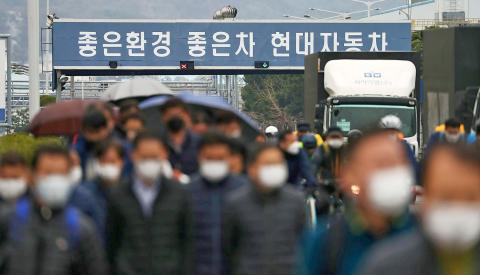Hyundai Motor Co yesterday shut down a factory in South Korea after a worker tested positive for COVID-19, disrupting production of popular models such as the Palisade sport utility vehicle (SUV).
Shares of the automaker ended down more than 5 percent after the news, while the wider market was down 3.3 percent. The closing dealt a fresh setback to Hyundai, which has gradually resumed production at local plants hit by a parts shortage in the wake of an outbreak in China.
South Korea has the most infected people outside of China, affecting companies like Samsung and Hyundai.

Photo: Reuters Via Yonhap
“The company has also placed colleagues who came in close contact with the infected employee in self-quarantine and taken steps to have them tested for possible infection,” Hyundai said in a news release.
The company added that it was disinfecting the factory. It did not say when production would resume.
The factory is in Ulsan, less than an hour from Daegu, the epicenter of outbreak in South Korea.
Hyundai operates five vehicle factories in Ulsan, which has an annual production capacity of 1.4 million vehicles, or nearly 30 percent of Hyundai’s global production. Hyundai employs 34,000 workers there in the world’s biggest auto complex.
The factory that was shut down produces SUVs such as the Palisade, Tucson, Santa Fe and Genesis GV80.
A factory run by Hyundai supplier Seojin Industrial Co Ltd had been closed after the death of a virus-infected worker there. It reopened on Wednesday.
South Korean tech giant Samsung Electronics Co Ltd shut down a smartphone factory in the southeastern city of Gumi over the past weekend after one of its workers tested positive. It resumed production on Monday.
South Korea’s top carrier, Korean Air Lines Co Ltd, yesterday said that it would redue the number of flights to the US next month as part of a plan to cut its global capacity by 11 percent that month.
It plans to check the temperatures of passengers traveling to the US before boarding and said that it would not allow anyone with a temperature higher than 37.5°C to fly.
One of its flight attendants who served the Incheon-Los Angeles route has tested positive for virus.

SEEKING CLARITY: Washington should not adopt measures that create uncertainties for ‘existing semiconductor investments,’ TSMC said referring to its US$165 billion in the US Taiwan Semiconductor Manufacturing Co (TSMC, 台積電) told the US that any future tariffs on Taiwanese semiconductors could reduce demand for chips and derail its pledge to increase its investment in Arizona. “New import restrictions could jeopardize current US leadership in the competitive technology industry and create uncertainties for many committed semiconductor capital projects in the US, including TSMC Arizona’s significant investment plan in Phoenix,” the chipmaker wrote in a letter to the US Department of Commerce. TSMC issued the warning in response to a solicitation for comments by the department on a possible tariff on semiconductor imports by US President Donald Trump’s

The government has launched a three-pronged strategy to attract local and international talent, aiming to position Taiwan as a new global hub following Nvidia Corp’s announcement that it has chosen Taipei as the site of its Taiwan headquarters. Nvidia cofounder and CEO Jensen Huang (黃仁勳) on Monday last week announced during his keynote speech at the Computex trade show in Taipei that the Nvidia Constellation, the company’s planned Taiwan headquarters, would be located in the Beitou-Shilin Technology Park (北投士林科技園區) in Taipei. Huang’s decision to establish a base in Taiwan is “primarily due to Taiwan’s talent pool and its strength in the semiconductor

Industrial production expanded 22.31 percent annually last month to 107.51, as increases in demand for high-performance computing (HPC) and artificial intelligence (AI) applications drove demand for locally-made chips and components. The manufacturing production index climbed 23.68 percent year-on-year to 108.37, marking the 14th consecutive month of increase, the Ministry of Economic Affairs said. In the first four months of this year, industrial and manufacturing production indices expanded 14.31 percent and 15.22 percent year-on-year, ministry data showed. The growth momentum is to extend into this month, with the manufacturing production index expected to rise between 11 percent and 15.1 percent annually, Department of Statistics

An earnings report from semiconductor giant and artificial intelligence (AI) bellwether Nvidia Corp takes center stage for Wall Street this week, as stocks hit a speed bump of worries over US federal deficits driving up Treasury yields. US equities pulled back last week after a torrid rally, as investors turned their attention to tax and spending legislation poised to swell the US government’s US$36 trillion in debt. Long-dated US Treasury yields rose amid the fiscal worries, with the 30-year yield topping 5 percent and hitting its highest level since late 2023. Stocks were dealt another blow on Friday when US President Donald